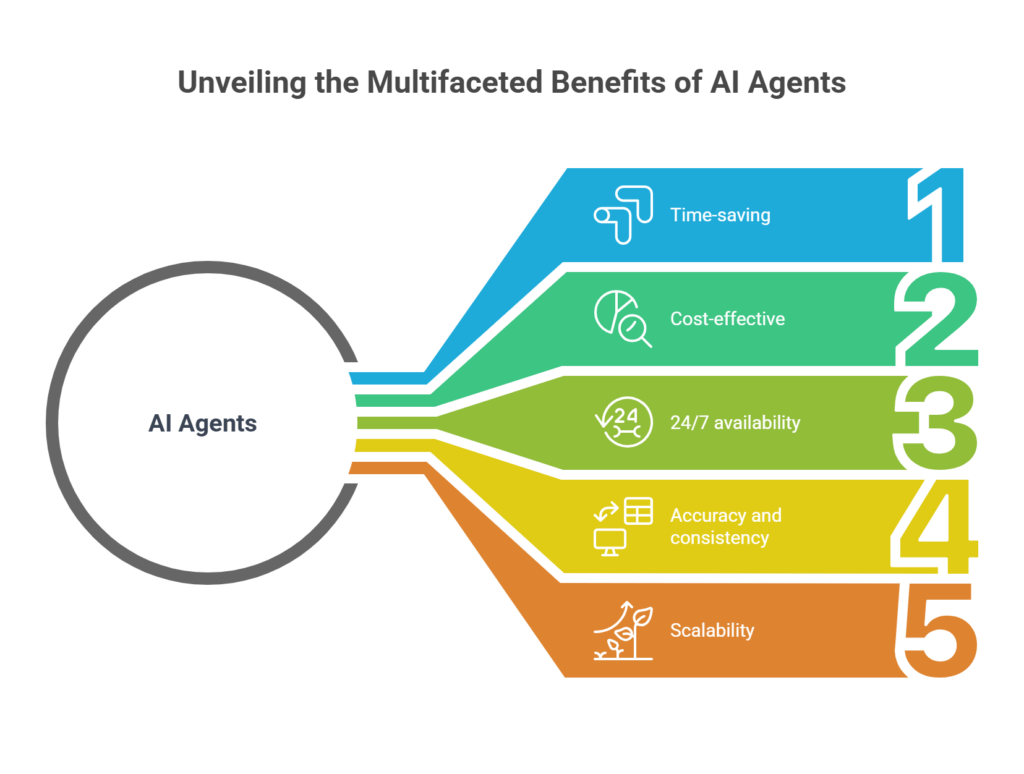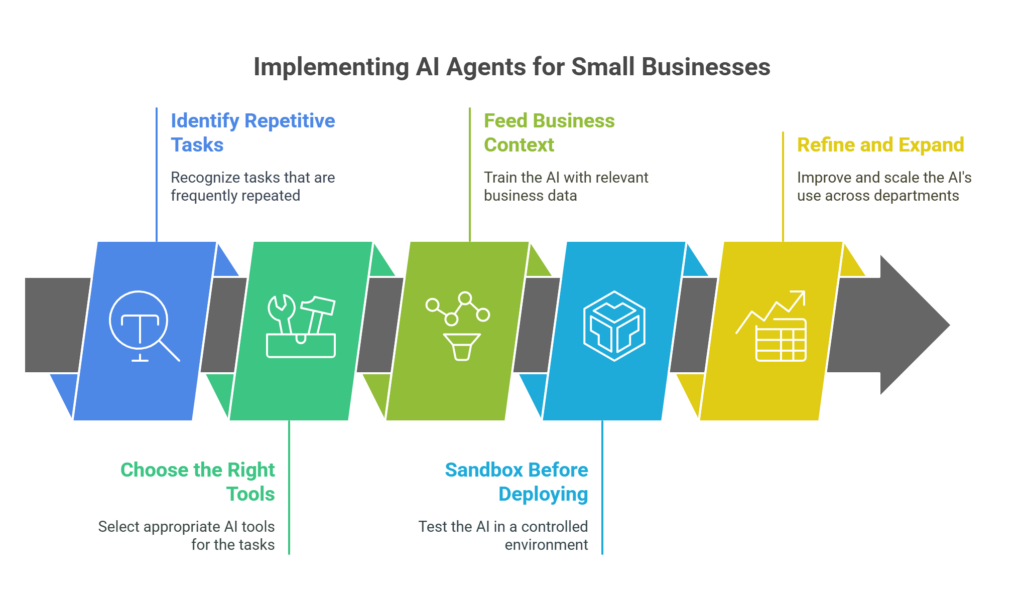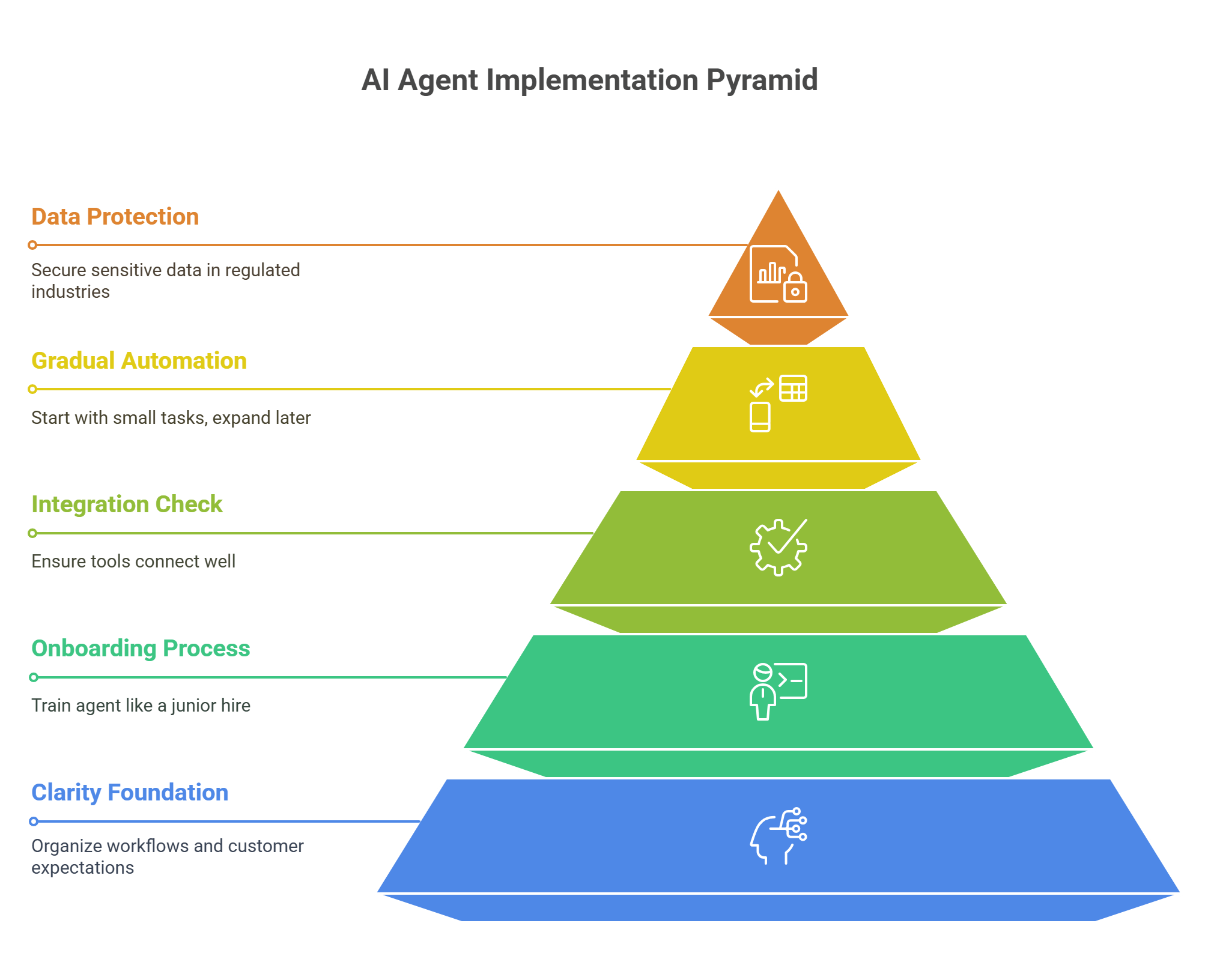It starts with a feeling. You’re spending late nights catching up on customer emails, manually updating spreadsheets, chasing follow-ups, and wondering if this is what running a small business is supposed to feel like. You didn’t sign up for this to become a human task manager. You wanted impact, freedom, and growth. What you’ve ended up with is burnout.
That’s where AI agents for small businesses come in.
Why AI Agents Matter for Small Businesses
AI agents for small businesses are no longer experimental tech. They’re part of a shift already underway. According to a 2025 survey by Service Direct, 77% of U.S. small businesses reported using AI in some form with, up from just 29% in 2022.
What’s driving this? Small business owners are realizing they no longer need to fill every operational gap themselves. AI agents for business automation are stepping into roles once filled by stretched-thin human teams responding to leads, tracking invoices, handling support queries, and even sorting and tagging documents. In effect, they’re becoming part of the team, minus the overhead.
Benefits of AI Agents for Small Businesses

Let’s break down what makes AI agents so impactful:
- Time-saving: AI agents can automate recurring tasks like appointment scheduling, customer onboarding, lead nurturing, and more. A 2025 QuickBooks study found SMBs using AI saved an average of 11.4 hours per employee per week.
- Cost-effective: There’s no hiring or training process, no salaries, and no employee churn. AI tools are typically subscription-based or built once and iterated on.
- 24/7 availability: AI agents don’t stop working when you log off. Customer queries that arrive at midnight get immediate answers, improving satisfaction and conversion rates.
- Accuracy and consistency: Unlike humans, AI agents don’t get tired. This reduces errors in invoicing, data entry, and customer communication.
- Scalability: As you grow, your agents grow with you, simply upgrade models or increase tasks assigned. No need for rehiring or reskilling.
Each of these benefits compiles into a single ROI metric: saved time and higher output without proportional increases in input.
AI Agents Use Cases for Small Businesses
AI agents for business are versatile and can be applied across various business functions:
- Customer Service: AI-powered chatbots handle customer inquiries efficiently, improving response times and satisfaction.
- Sales and Marketing: AI tools analyze customer data to personalize marketing campaigns and predict sales trends.
- Inventory Management: AI systems forecast inventory needs, reducing overstock and stockouts.
- Financial Management: AI agents for business assist in bookkeeping, invoicing, and financial forecasting, enhancing accuracy and efficiency.
- Human Resources: AI streamlines recruitment by screening resumes and scheduling interviews.
In the telehealth sector, AI agents for business are gaining momentum by managing patient appointments, sending reminders, and even assisting in preliminary diagnostics. Platforms like xlwith.ai are at the forefront of integrating agentic AI into healthcare, demonstrating the versatility and impact of AI agents across industries.
Implementing Guide for AI Agents for Small Business

Don’t let the tech buzzwords intimidate you. Here’s a practical roadmap:
- Identify Your Repetitive Tasks: Anything repeated daily or weekly is a good candidate. These include FAQs, data entry, customer onboarding, and reporting.
- Choose the Right Tools: Open-source LLMs, such as Mistral or DeepSeek, offer flexibility; tools like LangGraph or AutoGen help orchestrate behavior. Plug in LangChain for memory and planning.
- Feed Business Context: Your agent is only as good as the data it sees. Train it using your SOPs, emails, past tickets, and tone guides.
- Sandbox Before Deploying: Test the agent in low-risk settings like internal ops or non-customer-facing roles.
- Refine and Expand: Once it proves ROI, duplicate and assign more workflows. Support > Sales > HR > Marketing.
The mistake many businesses make is starting too big. Start with one well-defined task. Let success guide expansion. If you are looking for someone to help make this progress easier. Reach out to us.
How Much Does an AI Agent Development Cost?
Costs depend on the level of customization and integration needed. Here’s a breakdown:
| Agent Type | Cost Range | Features |
| Basic | $500–$2,000 | Pre-trained, handles single function (e.g., email assistant) |
| Mid-range | $3,000–$10,000 | Custom-trained, multi-function (support + sales + reporting) |
| Enterprise/Agentic System | $15,000+ | Multi-agent, real-time learning, integrated with business systems |
Tip: The average ROI becomes evident within 6–8 weeks of deployment through time saved and improved lead handling.
Disclaimer:
All cost estimates are based on general industry standards and may vary depending on project scope, features, and requirements. Final pricing will be confirmed after a detailed assessment.
What You Should Know Before Getting Started
Before you build or bring in an AI agent, it helps to reset expectations. These tools are incredibly capable, but they won’t work well if they’re dropped into a messy or unclear setup.

Here’s what we recommend thinking about ahead of time:
- Start with clarity: If you’re unclear about your own workflows or customer expectations, your AI agent won’t know where to begin. Organize your processes first — even a simple Notion doc or shared Google Sheet can be enough.
- Treat it like onboarding a junior hire: The agent needs to be shown how you speak, how you respond, and what you prioritize. One-time setup isn’t enough. You’ll need to review and course-correct in the early days.
- Watch your existing stack: If you’re using a collection of old tools that don’t connect well, integrations might need extra setup. Make a list of what you use and what access you can give before starting.
- Don’t rush full automation: Some businesses try to automate every task from day one, and it ends up breaking trust. Let your agent prove itself on smaller tasks first, then expand gradually.
- Handle sensitive data with intention: Especially if you’re in healthcare, finance, or law, you’ll want to double-check where your data lives, who sees it, and whether it’s protected.
If you’re aware of these from the start, you’ll avoid the most common hiccups and set up your agent for long-term success. If this seems tedious, we are happy to help you assess and provide consultancy for AI integration through xlwith.ai.
Checklist – Is Your Business Ready for AI Agents?
Not every business needs AI agents immediately. But if you check off several of these, you’re probably ready to start:
- You or your team spend over 10 hours a week on repeat tasks.
- Customers often ask the same few questions.
- Your support or sales pipeline isn’t getting the attention it deserves.
- You feel stretched thin managing admin work and growing the business.
- You already use digital tools like CRMs or chat widgets but they’re not “smart.”
- You’ve got data sitting around (emails, helpdesk tickets, forms) that could train an agent.
If you nodded at three or more, your business could likely benefit from AI agents today, not someday.
Use Cases by Industry
The most important thing to remember when integrating AI into your operations is that their impact depends on how well they understand the needs of your industry. Let’s try to get a little bit of insight into common usecases.
Retail & E-commerce (D2C brands)
Your customer gets an email about their order and replies with, “Hey, can I change the delivery address?” An AI agent trained on your policies and tone can handle that instantly. It can also manage return requests, nudge for reviews post-purchase, and analyze buying patterns to suggest next-best offers.
Real Estate
Imagine someone browsing your property listing at 11 p.m. They fill out a query form. By morning, the AI agent has already responded with tailored options, booked a walkthrough, and logged their preferences in your CRM. No more missed leads or delayed follow-ups.
Fitness & Coaching Businesses
AI agents here don’t just schedule classes. They can nudge clients who haven’t shown up in a while, send progress check-ins, upsell personalized plans, and even share auto-generated wellness content aligned with each user’s goals.
Legal Services & Consultancy
A potential client reaches out. Your AI agent asks a few intake questions, qualifies them, then prepares a rough outline of what services might be needed. Meanwhile, your human team only steps in when there’s real nuance or legal complexity to address.
Telehealth & Clinics
From booking appointments and checking insurance details to reminding patients to fast before a blood test: AI agents for businesses handle it all quietly in the background. They’re not trying to diagnose; they’re trying to make life easier for both the provider and the patient.
So what is the takeaway here? The more you train your agent with industry context, the more useful and human it becomes. That is why we at Enacton offer consultancy services for such workflow creations for industry-specific usecases.
What to Expect (and Avoid) When You’re Getting Started
The idea of “hands-off automation” is appealing, but no tool works like magic without some thoughtful prep. Here’s what most small business owners wish they knew upfront:
- You’ll need to teach it first. AI agents aren’t smart until you give them something to work with. That means uploading real data such as past email threads, FAQs, workflows and not hypothetical examples.
- You won’t automate everything right away. Trying to do too much too soon will backfire. It’s better to start small, maybe just booking or follow-ups, and layer on complexity over time.
- Tone matters. A good AI agent doesn’t just “answer.” It sounds like you. Spend time defining your tone of voice. Do you say “Hey” or “Hello”? Is your brand friendly or formal? The agent will pick it up if you show it.
- Expect hiccups. Even well-built agents make weird decisions early on. That’s normal. The key is iteration. Your first 100 interactions will teach you more than any demo.
- Data laws still apply. If you’re handling medical, financial, or legal information, make sure you know where your data is stored and processed. HIPAA and GDPR aren’t optional.
With this, our aim is not to stress you, but you help you set the right expectations so the roll-out doesn’t fizzle from unrealistic hopes. AI agents are powerful when you treat them as long-term teammates and not quick fixes. We specialize in building AI agents that help you upgrade your operations to reduce repetitive administrative tasks.
AI Agents – The New Normal
We’re seeing a structural shift. Workers want more flexibility. Owners want to reduce overhead. Customers expect faster service. The answer to all three: intelligent automation.
AI agents for small businesses are slowly becoming team extensions. Their presence frees you from menial labor so you can do high-leverage work: building relationships, scaling vision, and fixing what actually matters.
The narrative isn’t that humans are being replaced. It’s that humans are finally getting a break.
Why We’re Betting on Agentic AI at xlwith.ai
At Enacton, we’ve built dozens of custom agentic workflows. But the need went deeper. Founders weren’t just asking for automation. They were asking for alignment — tools that adapted to their day, didn’t need babysitting and delivered output they didn’t need to constantly correct.
That’s why we created xlwith.ai to provide small businesses with plug-and-play AI agents that think like operators, not scripts.
Whether it’s helping clinicians prep for appointments, coaches schedule calls, or DTC brands qualify high-value customers, our AI agents are making businesses more humane by reducing their grunt work.
What’s Next for AI Agents in Business?
Looking ahead, AI agents for small businesses will evolve beyond workflows. Multimodal agents will combine voice, video, and images. Emotional recognition and adaptive behavior will become the norm. Cross-system orchestration will let one agent manage finance while another handles leads all synced.
Small businesses that adopt now will be prepared not just for 2025 but for 2028, when these systems will be foundational.
Want to stop spending hours doing things you dread? Let the AI agents for business take over. Explore our MVP development service to test your idea or chat with us at xlwith.ai to start building your digital teammates and create your agentic workflows.
Frequently Asked Questions
What is an AI agent for small businesses?
It’s a software agent powered by AI that performs tasks like replying to messages, managing data, or automating workflows without needing to be explicitly told what to do each time.
Can AI agents fully replace employees?
No, and they shouldn’t. Think of them as digital team members who free up your human team to do more meaningful work.
Are AI agents expensive to set up?
Not necessarily. Many startups begin with simple, task-specific agents that cost less than hiring one part-time staff member.
How long until I see ROI?
Most businesses begin to see a time ROI within 3–6 weeks, depending on task complexity.
What tools are needed to build an AI agent?
We typically use OpenAI, Claude, LangGraph, or LangChain depending on the use case. If you’re not sure what fits, xlwith.ai can help you figure that out.
